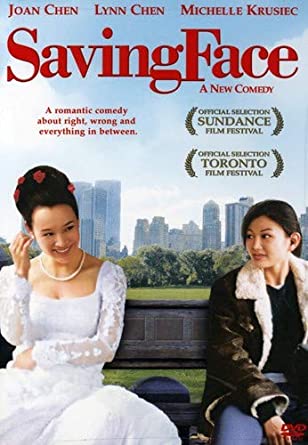Saving Face (2004)

| |
| Directed by | Alice Wu |
|---|---|
| Running time | 1h 37m |
| Core concepts this week |
family "face" diasporic identities coming out Sinophone studies |
| View on Amazon Prime | |
Film background
Saving Face was the directorial debut of Alice Wu. Her second feature film was The Half of It, (2020). The film was inspired partly by Wu’s coming-out experiences with her mother. The film was not a box office success, and only opened at 56 theaters, but it has been cited as a significant and influential queer and Asian-American film in the years since its release. Wu recently spoke to The New York Times about the challenges of making Saving Face, explaining: “I was trying to make the biggest romantic comedy I could on a tiny budget, with all Asian-American actors, and half of it in Mandarin Chinese.” Wu also explained to The New York Times that in initial meetings with producers and studio executives, pressure was placed on her to make the protagonist white, make the characters straight, and reduce the amount of Mandarin Chinese spoken in the film. It was nominated for awards at events such as the GLAAD Media Awards in the US and the Golden Horse Film Festival in China.
Plot summary
The film centers on Wil (Michelle Krusiec), who is a Chinese American surgeon living in New York. Wil attends a banquet at a dance hall in Flushing, Queens, where her mother’s family and friends typically gather each Friday. While her mother, “Ma” (Joan Chen), attempts to set her up with men at the banquet, Wil is drawn to Vivian (Lynn Chen), a ballet dancer, who also happens to be her boss’s daughter. Soon after, Ma is kicked out of her parents’ apartment when they learn that she is pregnant and will not identify who the baby’s father is. Ma moves in with Wil, and they attempt to function together in harmony, despite the secrets they keep from one another about their sexualities. Ma begins going on dates with potential suitors, and begins a relationship with Cho (Nathaniel Geng). Wil and Vivian begin to develop a relationship, but Vivian is frustrated by Wil’s obsession with work and her fear of moving their relationship outside the privacy of Vivian’s apartment. In contrast to Wil, Vivian is open with her mother about her sexuality. Vivian gets an opportunity to move to Paris to dance, and Wil is reluctant to stop her, especially after Vivian’s father discovers their relationship and criticizes Wil for foreclosing Vivian’s dreams of ballet. Wil comes out to Ma and is initially shut down by her mother, who feels her coming-out brings disrespect on the family. Following her own father’s wishes, Ma prepares to marry Cho; however, Wil discovers a letter from Yu (Brian Yang), who is the baby’s father and hopes to stop the wedding. Wil rushes to the wedding and convinces her mother to avoid marring Cho because she does not love him. Ma then convinces Wil to go to the airport to try to stop Vivian from leaving, but when Vivian asks her to kiss her in the airport to prove her willingness to live openly, Wil refuses. Vivian leaves for Paris. Three months later, Wil and Vivian arrive at a banquet in Flushing together; their mothers have concocted a plan to ensure their reunion at the event. Wil and Vivian reconcile and kiss on the dance floor. Some guests leave the party, horrified by their actions, but Wil and Vivian ignore them and continue the celebration with their community.
Content warnings
Saving Face contains one scene of sexuality, including brief nudity.
Notes
- This week, we are examining two film studies texts on Saving Face, rather than a film studies and queer theory text, since much has been written about this film specifically.
- You may want to have students watch the trailer for The Wedding Banquet before they complete the reading for Day 3, since there are some references to that film throughout Han’s text.
- I have redacted sections of both essays to reduce the reading load this week.
Materials
- Lesson plans [Word doc]
- Screening quiz [Word doc]
- Secondary materials:
- Day 2: Ka Hin Wong, Alvin. “From the Transnational to the Sinophone: Lesbian Representations in Chinese-Language Films.” Journal of Lesbian Studies. Vol. 16, no. 1, 2012, pp. 307-322. (Excerpt provided: pp. 307-309, 314-320) [pdf]
- Day 3: Video: The Wedding Banquet Trailer (Watch before class)
- Day 3: Han, Qijun. “Diasporic Chinese Family Drama Through A Transnational Lens: The Wedding Banquet and Saving Face.” International Journal of Media and Cultural Politics Vol. 15, no. 3, 2019, pp. 323-343. [pdf]
- Optional: Video: Alice Wu Interview (Students interested in filmmaking may find this interview inspiring and interesting)